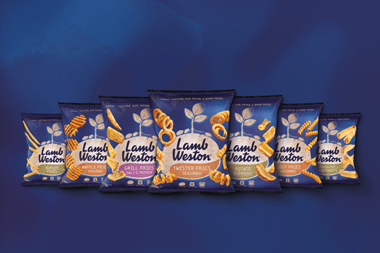SABIC, Lamb Weston, and OPACKGROUP have collectively packaged frozen potato products in a thin, low-weight coextrusion film, with at least 60% made using bio-feedstock from used cooking oil; the pack claims to reduce the previous design’s carbon footprint by 30%.
Used cooking oil from Lamb Weston’s production processes is collected and converted into bio-feedstock. This is then used to produce certified bio-renewable SABIC HDPE and SUPEER mLLDPE polymers.
OPACKGROUP member Oerlemans Plastics then converts the polymers into a multilayer PE film to package Lamb Weston’s pre-fried frozen potato products.
Reportedly, the final pack contains at least 60% bio-renewable polymer material sourced from used cooking oil, falling under SABIC’s TRUCIRCLE portfolio. This aligns with the ISCC PLUS mass balancing regime for tracking and tracing renewable content in materials, SABIC says.
Furthermore, the bags are said to have an average unit weight of 10g and reduce film thickness by 20%. Combined with the use of bio-renewable PE, this alteration is believed to cut the previous bag’s carbon footprint by 30%.
Both the SABIC HDPE and SUPEER mLLDPE resins are compliant with the European Food Safety Authority (EFSA) and the U.S. Federal Drug & Food Administration (FDA)’s standards for food-contact materials. The HDPE resin is believed to provide strength and flexibility, while the mLLDPE is suited to bag sealing.
‘Extensive’ testing and evaluation is said to have taken place, with the first frozen potato products packaged in bio-renewable PE bags launched in the UK and the Netherlands back in September.
“We are excited about the collaboration with Lamb Weston and OPACKGROUP in this closed-loop project,” comments Khaled Al-Jalawi, global director of Circular Economy Business at SABIC. “Such a project demonstrates the concept of circularity as it better utilizes the UCO to produce circular polymers that is designed for recyclability via a closed loop approach.”
Sebastiaan Besems, Vice President Commercial EMEA from Lamb Weston, continues: “Distributors, retailers and consumers have become increasingly conscious of their environmental impact and show a growing preference for more sustainable packaging. We have anticipated this trend and developed an industry-leading bio-circular retail packaging solution for our pre-fried frozen potato products that provides a highly responsible value proposition.
“As part of our ambitious sustainability plans and innovations for the frozen potato category, the brand’s new European retail pack is made with 60% bio-circular plastic originating from Lamb Weston’s used cooking oil and is ISCC PLUS certified. By using SABIC’s bio-renewable polymer, less and better packaging, this innovation reduces the carbon footprint of our retail bags by 30%, aligning with consumer expectations that FMCG brands are as environmentally friendly as possible.
“The success of this project also meets with our goals to halve our food waste, cut our overall product carbon footprint by 25% and move to more circular production by 2030.”
Laura Hanegraaf, sales manager at Oerlemans Plastics, adds: “The project solidifies the committed efforts we have undertaken with SABIC to promote low carbon and renewable products within our industry and represents a significant advancement. It allows us to offer our customers high-quality flexible film products made with renewable material from used cooking oil.”
In another partnership, SABIC previously joined forces with Estiko Packaging Solutions and Coldwater Prawns of Norway to develop an ISCC PLUS-certified pouch for frozen prawns. 60% of the multilayer film was said to constitute ‘ocean-bound’ plastic waste.
The company also worked with FONTE and Napco National to create bread bags made of ‘fully recycled’ post-consumer polyethylene. Apparently, these are made using 100% mass-balanced certified content of recycled feedstock from mixed post-consumer plastic streams.

